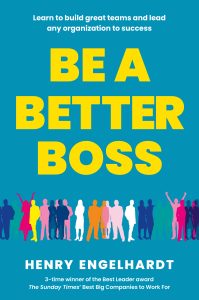This is the second piece by Henry Engelhardt, above, in a three-part analysis of what makes a successful business person. Henry is founder and CEO emeritus of Admiral Group plc. In this piece, Henry considers what it takes to be good with people. Click here to read his first article. The third and final article will appear next week.
By Henry Engelhardt
The second key to building a successful organisation and being a great leader is to be great with people. When I’m doing management lectures I’ll ask the managers if they have targets/objectives. They all raise their hands. Then I ask them if they can hit their targets themselves. They look at me as if I’ve fallen out of a tree. Of course, they can’t hit their targets themselves. Well, hey, that’s the first lesson in people management: those are the people who are going to hit your targets for you! Are they important? Worthy of your time and attention? Only if you want to hit your targets! (Or, if you want to be a great manager, blow your targets out of the water.)
Then I pose another question. When you did your best work, be it in school or work or wherever, was it something you enjoyed and wanted to do, or something you disliked and forced to do? Almost invariably they’ll say it was the former, something they wanted to do.
That’s your second lesson! If you did your best work on something you enjoyed, then why wouldn’t you think your people are similar? Make the environment enjoyable and you are more likely to get their best work. Yes, threatening, bullying or negative management can work for short periods of time. But such management techniques don’t tend to go the distance. And business is a long game, it’s not a sports season that ends, you rest for a couple of months and then go back to it; it’s continuous and you want your people to be as energised and producing great work in year two, year 12 and year 22. If you pressure your people unnecessarily then you don’t get their best work, certainly not over the long-term.
There are countless ways to be a good or great people manager. But it starts with an awareness of your impact on people and continues with your understanding how important everyone in the organisation is.
If you don’t currently say ‘hello’ or ‘good morning’ to the person who cleans the bathrooms then you don’t understand that everyone is important. If you don’t think that person is important, give them a week off and see at the end of the week if you still don’t think what they do is important!
I used to tell everyone who reported to me, and try to remind myself, that you can’t forget how important you are to the people you manage. If you say something flippant about someone, perhaps you’re trying to be funny or prove how smart you are, you may leave them in tears (I’ve seen it happen!); you might not think twice about the comment, but you might have ruined someone’s week. On the other hand, you say something nice, something positive about someone, they go home and tell mom, dad, the dog, everyone knows.
Here’s two great words which are powerful tools in the leader’s tool box: Thank You.
There have been times I’ve seen a member of staff achieve something really good and asked her/his manager what they were doing to recognise the accomplishment. The reply made my blood boil: “Why should we do something? That’s what we pay them for.”
Managers like this just don’t get it. Okay, very few people are going to work in a place that doesn’t pay them. Fair. But we all need more than money to do our best work. We need attention, recognition, care, appreciation, challenge and more.
I recommend leaders get a stack of Thank You cards and make a point to handwrite at least one Thank You card a week to someone deserving in their organisation. It’s amazing how much power a handwritten card will have.
Great people management is very complex and difficult to be consistently great at. So many things occur that they never teach you at business school! Just remember, when you get anywhere near the office (or Zoom call) it’s ‘curtain up – you’re on!’ That doesn’t mean you should have an inflated head that can’t get through the office door, but just to remember that your people will be a reflection of your energy and the way you conduct yourself.
 Henry Engelhardt is the founder and CEO emeritus of Admiral Group plc. He started the insurance company in the early 90s (it was called Admiral so that it would appear at the top of the Yellow Pages’ listings). Originally American, Henry settled in Wales attracted by the tax breaks the region offered to set up new enterprises. Today, Admiral is headquartered in Cardiff and is the the only FTSE 100 company in Wales. It is the 50th largest listed company in the UK. Moreover, it has been consistently included in the Sunday Times Best Companies to Work in the last 20 years. Henry’s new book, Be a Better Boss: Learn to build great teams and lead any organisation to success, is published by whitefox publishing.
Henry Engelhardt is the founder and CEO emeritus of Admiral Group plc. He started the insurance company in the early 90s (it was called Admiral so that it would appear at the top of the Yellow Pages’ listings). Originally American, Henry settled in Wales attracted by the tax breaks the region offered to set up new enterprises. Today, Admiral is headquartered in Cardiff and is the the only FTSE 100 company in Wales. It is the 50th largest listed company in the UK. Moreover, it has been consistently included in the Sunday Times Best Companies to Work in the last 20 years. Henry’s new book, Be a Better Boss: Learn to build great teams and lead any organisation to success, is published by whitefox publishing.

